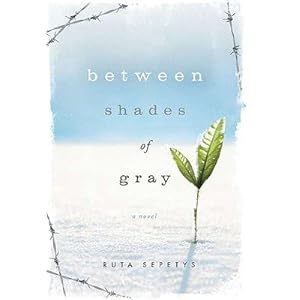 Bibliographic Information:
Bibliographic Information:Print:
Sepetys, Ruta. 2011. Between shades of gray. New York: Philomel Books. ISBN 0399254129
Spoken Recording:
Sepetys, Ruta. 2011. Between shades of gray. Read by Emily Klein. New York: Penguin Audio. ISBN 0142428973
Plot:
Shortly after the annexation of Lithuania and other Baltic States by the Soviet Union 1940, fifteen-year-old Lina is taken along with her family and thousands of other Lithuanians to work camps in Siberia and eventually the Arctic. Lina tells the story of their imprisonment and the brutality of treatment that was suffered while also recounting the stories of courage and kindness shown by fellow deportees and even occasionally by their captors. Interspersed in her narrative are flashbacks to happier times in Lina's past, most of which foreshadow what would later happen to her family. Separated from her father, she uses her artistic talent to leave messages and clues for him in hopes that one day they will be reunited. Although Lina will lose both of her parents to the harrowing ordeal, her spirit is not conquered. She and her brother survive to eventually return to their home and Lina preserves her memories of that time to pass along to future generations so the world will know and not forget the atrocities that so many people endured.
Analysis:
In an author's note at the book's end, Sepetys describes her Lithuanian heritage and the research she did for the story. The deportation of Lithuanians, Latvians, and Estonians to Siberia has been largely unknown or unacknowledged by western Europe or North Americans, and the Soviet Union never admitted to the events portrayed in the novel, but according to Sepetys the story survived because of people like Lina who recorded their histories and hid them away, who passed the story on so that one day the world would know. Sepetys drew upon these firsthand accounts and interviews with those who survived to capture the reality of the world in that time. Her descriptions of the living conditions and the harsh treatment of the soldiers who were their captors are brutal but create a vivid setting to communicate the severity of the the time period. Bits of dialogue in both Lithuanian and Russian remind readers of the setting as well as the language barriers between characters. So many of the characters reveal what is best (and what is worst) in people: bravery, dignity, kindness, and strength in the face of extreme hardship are present in the same characters who are scared, selfish, pushed beyond the limits of endurance, and broken. Lina, especially, manages to display the mercurial moods of adolescence while being forced to come to maturity and take on responsibilities far beyond what is normally asked of a fifteen-year-old. The flashbacks reveal glimpses of her old life, a time marked by an innocence that is quickly lost. Ultimately Sepetys manages to not only bring a forgotten history to light but also to convey a valuable message about the human spirit in the face of suffering, something that will resonate when readers consider the resilience of those who successfully overcome hardships today.
In the audio version of the novel, the narrator Klein uses inflection, pacing, and modulation to convey the strong emotions of the story although the character voices in dialogue can be distracting. In written form the flashbacks are set apart by italics to denote a break in the chronology. In the audiobook there is no such warning, but eventually readers may adapt to the change in rhythm of the story that these flashbacks represent.
Awards & Reviews:
2012 Golden Kite Award
2012 IRA Young Adult Book Award
New York Times Book Review Notable Children's Book of 2011
Booklist Top Ten First Novels for Youth, Top Ten Historical Novels for Youth & starred review: "an important book that deserves the widest possible readership"
Publisher's Weekly, starred review: "The narrative skillfully conveys the deprivation and brutality of conditions . . ."
Starred review in School Library Journal: "there are uplifting moments when the resilience of the human spirit and the capacity for compassion take over"
Starred Kirkus Reviews: "bitterly sad, fluidly written historical novel . . . flowing prose"
Connections:
- Visit the book's website (betweenshadesofgray.com) to view an author interview and download a book discussion guide to use with book club or discussion group.
- Explore the historical setting of the novel through books that Sepetys used in her research: A Stolen Youth,a Stolen Homeland by Grinkeviviciute, Sentence: Siberia by Lehtmets and Hoile, Leave Your Tears in Moscow by Armonas, and Lithuanians in the Arctic by the Laptevieciai Organization
- Historical fiction set in communist-era Soviet Union:
Fine, Anne. 2008. The road of bones. New York: Farrar, Straus and Giroux. ISBN 0374363161
Müller, Herta, and Philip Boehm. 2012. The hunger angel: a novel. New York: Henry Holt and Co. ISBN 080509301X
Yelchin, Eugene. 2011. Breaking Stalin's nose. New York: Henry Holt. ISBN 0805092161
No comments:
Post a Comment